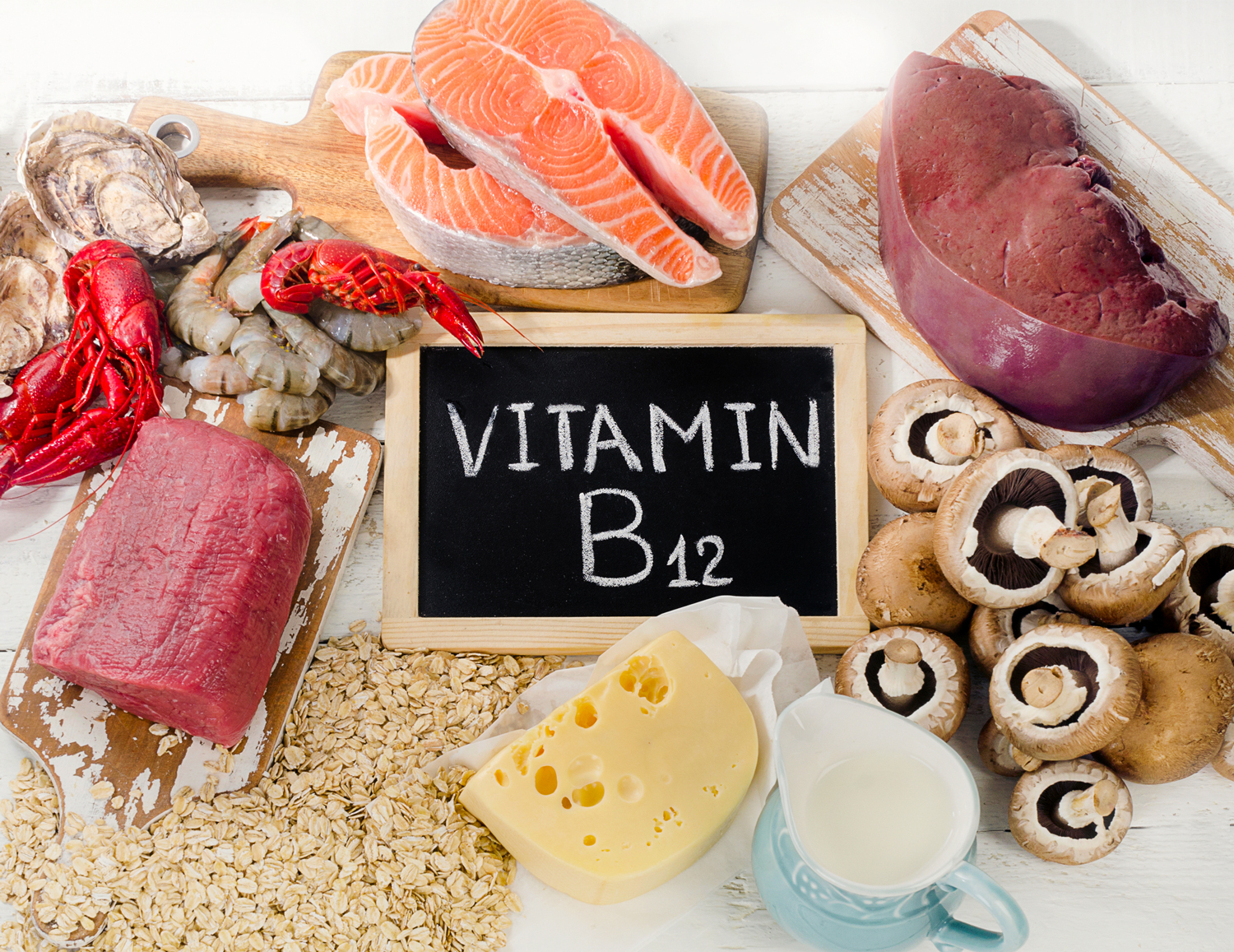Vitamin B12 is the only vitamin that contains a metallic element, namely cobalt. For this reason, it is often referred to as cobalamin.
Types
There are four main types of vitamin B12 — cyanocobalamin, hydroxocobalamin, adenosylcobalamin and methylcobalamin.
All of them can be found in supplements, although cyanocobalamin is the most common. It is considered ideal for supplements due to its stability, but is only found in trace amounts in food.
Hydroxocobalamin is the most common naturally occurring form of vitamin B12, and is widely found in animal-sourced foods.
The other natural forms methylcobalamin and adenosylcobalamin have become popular as supplements in recent years.
Role and Function
- Like all other B vitamins, vitamin B12 acts as a coenzyme.
- Adequate intake helps maintain brain function and development, neurological function, and the production of red blood cells.
- It is also required for converting protein and fat into energy and is essential for cell division and DNA synthesis.
Dietary Sources
- Animal-sourced foods are virtually the only dietary sources of vitamin B12. These include meat, dairy products, seafood and eggs.
- The chart below shows some of its richest sources and their content.
- Other rich sources include other types of liver, heart, octopus, oysters, herring and tuna.
- However, tempeh and a few algae, such as nori seaweed, may also contain small amounts of vitamin B12. Whether these foods can provide sufficient amounts on their own is a matter of debate.
- Other algae, like spirulina, contain pseudovitamin B12, a group of compounds that are similar to vitamin B12, but unusable by the body.
Recommended Intake
The table below shows the RDA for vitamin B12. As usual, the RDA hasn’t been established for infants, so the adequate intake (AI) is presented instead.
RDA (mcg/day)
Infants 0–6 months 0.4*
7–12 months 0.5*
Children 1–3 years 0.9
4–8 years 1.2
9–13 years 1.8
Adolescents 14–18 years 2.4
Adults 19+ years 2.4
Pregnancy 2.6
Lactation 2.8
*Adequate intake
Deficiency
- Vitamin B12 is stored in the liver, so even if you aren’t getting enough of it, it may take a long time for deficiency symptoms to develop.
- Those who are at the greatest risk of deficiency are those who never or rarely eat animal-sourced foods. This includes vegetarians and vegans.
- Deficiency may also develop in older people. In fact, many require regular vitamin B12 injections.
- Vitamin B12 absorption depends on a protein produced by the stomach called intrinsic factor. As people age, the formation of intrinsic factor may reduce or stop altogether.
- Other risk groups include those who have had weight loss surgery or suffer from Crohn’s disease or celiac disease.
- Deficiency may cause various health problems, such as anemia, appetite loss, sore tongue, neurological problems and dementia.
Side Effects and Toxicity
- Only a small proportion of vitamin B12 can be absorbed from the digestive tract. The amount absorbed depends on the production of intrinsic factor in the stomach.
- As a result, no adverse effects have been linked with high intake of vitamin B12 in healthy people. The tolerable upper intake level has not been established.
Benefits of Supplements
- While vitamin B12 supplements benefit people at risk of deficiency, less is known about their effects among those who get adequate amounts from their diets.
- One small study suggests that taking 1,000 mcg per day may improve verbal learning in people recovering from strokes, but more research is needed.
- Additionally, injections of hydroxocobalamin are used to treat cyanide poisoning, usually in combination with sodium thiosulfate.
Summary of Vitamin B12
- Vitamin B12 functions as a coenzyme and plays a vital role in many metabolic pathways. It also helps maintain neurological function and the formation of red blood cells.
- It is found in virtually all animal-sourced foods, but is absent from plant foods.
- As a result, vegans are at risk of deficiency or poor vitamin B12 status. Older people are also at risk because of impaired absorption. Anemia and impaired neurological function are classic deficiency symptoms.
- High supplemental intake doesn’t have any known adverse effects. No strong evidence shows that they have benefits either, at least not in those who get adequate amounts from their diets.

